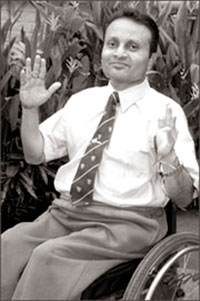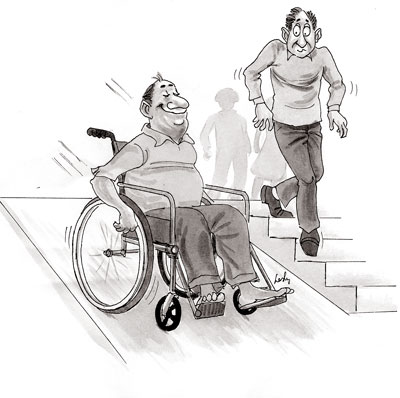Social service is obligatory
 Recently
inside a new outlet of a leading chain of supermarkets, a pregnant lady
had a narrow escape from a nasty fall while attempting to walk down a
steep ramp which could have easily made her lose the baby she was
carrying during her heavily pregnant state. The cause for such an
accident was due to the thoughtless basic design structure of having a
narrow ramp as railing for support, thus increasing the safety hazard. Recently
inside a new outlet of a leading chain of supermarkets, a pregnant lady
had a narrow escape from a nasty fall while attempting to walk down a
steep ramp which could have easily made her lose the baby she was
carrying during her heavily pregnant state. The cause for such an
accident was due to the thoughtless basic design structure of having a
narrow ramp as railing for support, thus increasing the safety hazard.
|

Dr Ajith Perera |
There is a difference between the term ‘Disabled’ (Restricted
Ability) and ‘Handicapped’ people. ‘Handicapped’ is an offensive term
used to describe people who are physically or mentally challenged. A
person with ‘Restricted Ability’ can be any normal human being becoming
dependant to perform human functions effectively. Despite the subtle
stigma attached to both of these categories, the government and society
need to give more thought to this ill-fated situation by stepping into
such peoples’ shoes -proverbially speaking.
Public facilities
A wider sector of Sri Lanka’s population, estimated at not less than
25 percent experience ‘Restricted Ability’ for different reasons. They
include pregnant mothers and those who suffer from debilitating medical
conditions like arthritis, sciatica, diminishing sight, etc. In 10 or
more years the number of senior citizens is predicted to rise up to 17
percent of the population. One must not forget the fact that despite
mobility restriction of such people they are all able, productive and
full-fledged citizens whom the society has a moral obligation to care
for.
What is the recommendation to discharge this social obligation? It
simply boils down to the designing factor in public facilities,
particularly the toilets and ‘wash’ areas, that waste human potential
and create superfluous dependency. In this area designers, architects
and all lawmakers and implementers need to look into the problem
seriously that many public buildings, supermarkets, banks, restaurants,
ATM machines etc., are constructed according to recommended standards
and design specifications incorporating laid down safety hazards.
Dr Ajith C S Perera, an Accessibility Activist, with all his
restricted ability, has been doing yeoman service over a considerable
period of time in a voluntary capacity to help the needy (like himself)
in a mission of national importance. His efforts finally bore fruit in
July 2009 initially to get the message across. In April 2011 Dr Perera
appeared in person in his wheelchair to present his case at the Supreme
Court to justify the situation on poor accessibility provided at public
buildings due to non-compliance of design specifications and laws in
force. He became successful in persuading the courts to issue several
orders, in the larger interest of society and the country, making it
mandatory for all building parts of new public buildings to be made
‘inclusive’, complying with standards and to bring ‘punitive
repercussion’ for violators. (The Supreme Court Orders of April 2011 -
Ref: SC (FR) 221/2009). Once these Court orders are implemented
effectively in a stringent manner, it will enormously benefit the
society and our country as a whole in several ways.
Economic and social development
 The
proper implementation of the Rule of Law has the power to prevent
potential safety hazards for ‘everyone’, thus enhancing quality of life.
For meaningful sustainable economic and social development, it is an
essential prerequisite towards arresting colossal waste and optimising
productivity. An indispensable investment brings rich dividends to the
country. In this regard the immediate crucial task would be to create
the widest possible awareness to these Supreme Court orders issued as a
NOTICE, to hasten implementation for the benefit of people’s lives and
the country. The
proper implementation of the Rule of Law has the power to prevent
potential safety hazards for ‘everyone’, thus enhancing quality of life.
For meaningful sustainable economic and social development, it is an
essential prerequisite towards arresting colossal waste and optimising
productivity. An indispensable investment brings rich dividends to the
country. In this regard the immediate crucial task would be to create
the widest possible awareness to these Supreme Court orders issued as a
NOTICE, to hasten implementation for the benefit of people’s lives and
the country.
Any society needs ‘designing for safety and inclusion’. It requires a
good understanding of its intricacies backed by proven practical
experience. Authorities undertaking construction hence need expert
guidance as to how best to achieve this right from the beginning to
prevent waste of resources later. In this regard professionals in the
category of Dr Ajith Perera, with commitment and proven competence, can
become a real asset to the country.
Public buildings are only the tip of the iceberg in our social
problem in this area. Transport is another vital aspect. How many people
with restricted ability can afford to hire vehicles or own cars to move
about? In developed countries provision is made in public buses with
seats allocated for such people to sit and travel; also are special
marked areas to fold their wheelchairs not to obstruct other passengers.
Restricted ability
Ambulances have ramps where people with restricted movement can be
lifted up hydraulically. So are school buses used to pick up such
affected children. Special ramps are designed in public transport
vehicles to help these people get in with ease. Social services provide
specially designed mini electric vehicles for some to travel about on
roads as well as on pavements. At the gates of registered ‘disabled’
persons’, special hand rails are fixed by Social Services Department to
aid them walk into the house from outside, inside toilets too aiding
rails are fixed; so are with specially designed shower cubicles to help
these categories.
Under the European Community law, people with restricted ability can
go on a stringent medical examination, and when qualified get parking
bays allocated in front of their houses; also on main streets where
parking is controlled ‘disabled persons’ parking bays help them to park
their vehicles.
These parking bays are clearly marked with a line drawing of person
in a wheelchair to indicate it is reserved for ‘disabled persons’
parking. Anyone else using such bays gets an expensive parking ticket
and may ultimately get such parked vehicles towed away, which will cost
the violator an arm and a leg to recover the vehicle from a car
compound.
Caring for the handicapped in our society is not a charity but is a
legal and a moral obligation that all responsible should put themselves
in ‘handicapped’ peoples’ situation and try to help each other.
[email protected]
|



